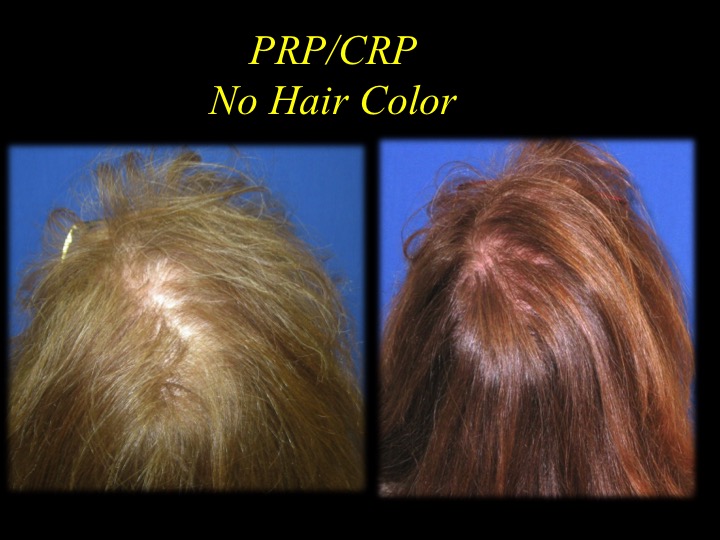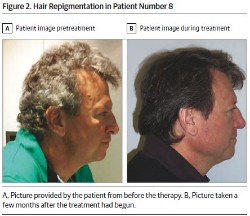The Cure for Grey Hair
Note that this post on a cure for grey hair was first published on Jan 4, 2016. An update on July 8, 2018 was necessary due to the publication of a number of new studies related to the biology of graying hair. Make sure to read through the end to see all the new information.
Over the past few years I have collected quite a few interesting links related to a cure for grey hair. I kept delaying writing this post because a permanent reversal of grey hair is obviously far less important than a cure for hair loss. However, there are some interesting ideas in reversing graying hair that are also relevant to reversing hair loss.
Moreover, if we get back a full head of hair by the end of 2020 as hoped, the vast majority of us will no doubt prefer that the new hair is pigmented. At that point, grey hair will be deemed to be a significant problem unless you prefer the sale and pepper look. Finally, for those of us who are balding as well as prematurely graying, it is a double whammy.
Why Does Hair Turn Grey?
A person’s hair color is determined by his/her pigment producing stem cells known as melanocytes working in conjunction with his/her hair follicle stem cells. Hair color depends on the presence and ratios of two types of melanins: eumelanins (brown and black pigments) and pheomelanins (red and yellow pigments). As people age, a natural buildup of hydrogen peroxide occurs in their hair follicles, which in turn causes oxidative stress, melanocyte destruction and subsequent graying (side note: many women use hydrogen peroxide solutions to go blonde).
In 2009, a team of scientists from Germany and the UK figured out why this hydrogen peroxide buildup occurs in people as they age and why hydrogen peroxide is to blame for graying hair. Basically, in younger people an enzyme called catalase breaks down hydrogen peroxide into water and oxygen. However, as people get older, they often have lower levels of this enzyme as well as lower levels of other enzymes called MSR A and B that repair hydrogen peroxide related damage to hair follicles. The combination of high levels of hydrogen peroxide and low levels of MSR A and B also disrupts the formation of an enzyme called tyrosinase, which is important to melanin production in hair follicles. Scientists think that something similar is at play in the skin condition called vitiligo. Link to actual study.
Anti–interleukin (IL)-17 Therapy: a 2018 Shocker
In May 2018, Italian scientists reported a complete reversal of grey hair in one 61-year old patient. He was undergoing interleukin-17 therapy with secukinumab to treat scalp psoriasis. He started getting white hair around the age of 45. The below before and after photo after 6 months of treatment is truly astounding. The 10-month follow up showed maintenance of results.
Note that this patient also saw new hair growth. The conclusion of the scientists is especially motivating: “hair whitening and thinning caused by the aging process might be reversible”.

Minoxidil could Reverse Grey Hair
In 2017, Dr. Wilma Bergfeld told the New York Times that:
“In early testing of the anti-hair-loss drug minoxidil, she and other researchers noticed the drug sometimes also restored hair color, suggesting it was rejuvenating the melanocytes”.
This is very surprising since Minoxidil has been in use for decades. Make sure to read my post on how Minoxidil works to regrow hair for more on this important FDA approved hair loss drug.
Is PC-KUS (a modified pseudocatalase) a False Flag?
In 2013, the same Germany and UK based team that was discussed earlier in this post came out with a potential way to reverse grey hair. According to the article:
“The researchers found that this massive build up of hydrogen peroxide can be reversed with a UVB-activated compound called PC-KUS, a modified pseudocatalase. The research team developed this new proprietary treatment.”
PC-KUS was also supposed to cure vitiligo. However, according to the UK’s NHS, the research and subsequent publicity on PC-KUS curing grey hair was a bit of a sham.
I am not sure if this avenue of work is definitely over, and perhaps these same scientists will surprise us and come out with better news in the future.
L’Oréal: A Pill to Prevent Grey Hair Forever
During the past decade, France’s cosmetics behemoth L’Oréal has led global research in the private sector when it comes to a search for a cure for grey hair. The company’s head of the “Hair Biology Group”, Mr. Bruno Bernard, is a co-inventor of a topical product to protect and/or regenerate the melanocytes of hair follicles. The patent for this product was filed in 2009.
Moreover, In 2011, L’Oreal announced that it was developing a pill that would prevent grey hair forever — as long as you continued to take the pill once a day permanently! The medicine contains an undisclosed fruit extract that mimics the chemical tyrosinase-related protein (TRP-2), an enzyme that protects pigment production. Unfortunately, this pill will not cause existing grey hairs to darken, but instead, just prevent new grey hairs from forming. The pill was supposed to become available in 2015, but now we are now well past that year.
Dr. Mayumi Ito, Wnt Signaling and Hair Pigmentation
Dr. Mayumi Ito is a renowned Japanese hair loss research scientist who got her Ph.D from Nagoya University in 2003. She now does research and teaching at New York University. She has co-authored numerous papers on the impact of Wnt signaling on hair follicle growth and regeneration. On this blog you can find many posts that discuss this important subject matter.
In 2011, Dr. Ito found that Wnt signaling also explains hair losing its pigmentation. Her team even restored hair color in mice in 2011 via manipulating the Wnt pathway. It remains to be seen when they will experiment in humans (via stem cell injection or gene therapy) and see a successful reversal of grey hair.
Update: Also in April 2016, scientists (led by Dr. Ito) at NYU Langone Medical Center in New York found the molecular pathways responsible for creating the color of skin and hair. They found that a signaling pathway known as Edn/EdnrB interacts with other pathways (in particular, the Wnt signaling pathway), which in turn causes the proliferation of melanocyte stem cells (McSCs) that are involved in the earliest stages of skin and hair pigmentation. This suggests that targeting Edn/EdnrB signaling in McSCs can be a therapeutic approach to promote hair pigmentation retention.
Is Dr. Cotsarelis also Working on Hair Repigmentation?
Interestingly, in December 2011, the renowned Dr. George Cotsarelis and Dr. Mayumi Ito co-filed for a patent titled: “Methods for generating new hair follicles, treating baldness, and hair removal.” This patent was approved in December 2015. In the description to the patent, it ends with “The present invention also provides methods for hair removal and inducing hair pigmentation.” Incredible. A three-in-one solution (hair regrowth, body hair removal, and grey hair reversal). If only Dr. Cotsarelis’ predictions and optimism would be realized faster than he thinks or claims.
Can Finasteride Make Grey Hair Darker?
Over the years, I have read quite a few testimonials on hair loss forums where Finasteride users have claimed that their hair darkened while on Finasteride (which reduces DHT levels). The majority of these patients had very limited quantities of grey hair to begin with, so it was hard for me to tell from their before and after photos (when available) if this phenomenon was true or not.
However, in 2014, forum member “bverotti” who is a hair transplant clinic representative in Belgium posted a stunning before and after image of one of the clinic’s patients on Finasteride. While it shows blonde hair turning brown, I think of that as the same as grey hair turning brown or black.
I think that DHT, besides making many people go bald, also makes some of them go grey much sooner. I do not know if this has ever been shown to be true in any kind of study, and I could be wrong in my observation.
Using similar logic as in the above paragraph regarding Finasteride, I think that the much stronger Dutasteride can also reverse grey hair. Moreover, a few of the commentators in my post on Dutasteride Testimonials mention that the drug darkened their hair.
Could Platelet-Rich Plasma (PRP) Darken Hair?
I have covered PRP to treat hair loss many times on this blog. While the results are never guaranteed and PRP will not bring back hair in totally bald areas of the scalp, there are now numerous doctors who believe in the product. I am skeptical, but willing to listen to them.
More relevant to this blog post’s subject matter, in November 2015, Dr. Carlos Wesley started an interesting thread on the BTT forums with a photo showing PRP and ACell mesotherapy darkening some previously transparent scalp hair. This was very surprising to me. Moreover, he states that “An additional finding that has also been observed by other practices throughout the world is that PRP can help return some of the original hair color to follicles.” It seems like PRP could be stimulating melanocytes in hair follicles.
Update: A number of other doctors have confirmed this phenomenon of PRP darkening hair color in rare instances.

Could Stem Cell Transplants Cure Grey Hair?
I have discussed Dr. Takashi Tsuji on this blog numerous times in the past. Several of his old videos have shown black pigmented hair growing on a mouse after stem cell transplantation. Moreover, this article on his work has the following sentence in it: “He combined a number of stem cells to adjust the density and color of the hair, raising the possibility of a cure to graying strands.”
Will Telomerase Activation Therapy Reverse Grey Hair?
There are a number of online testimonials regarding telomarase therapy via the ingestion of the TA-65 supplement reversing grey hair and/or growing new hair. There are also many opinions to the contrary. I cover all this and more in my post titled “TA-65. telomerase activation and hair regrowth“.
Immunotherapy Reverses Grey Hair

In 2017, scientists were able to reverse grey hair in 14 patients using a new immunotherapy based cancer treatment. The before and after picture of one of the patients is extraordinary. In recent years, research has found a connection between immune system involvement in both hair loss and hair premature greying of the hair.
Cancer Treatments that lead to Hair Repigmentation
There have been various reports of drugs that treat cancer being able to repigment hair in rare instances. For example:
- Brentuximab darkens 73 year old man’s hair color from blonde to salt and pepper.
- Lenalidomide causes repigmentation of elderly patient’s hair.
- Erlotinib-induced hair repigmentation.
Stem Cell Factor (SCF) Protein and Hair Color
In 2017, scientists at UT Southwestern Center in the US led my Dr. Lu Le found that a protein called stem cell factor (SCF) was essential for hair pigmentation. Full study here.
Fluoxetine (SSRI)
Antidepressants such as Selective Serotonin Reuptake Inhibitors (SSRIs) have been known to cause hair loss. However, in 2017, a report from Germany discussed how Fluoxetine promoted hair follicle pigmentation. However, the work was done in dissected sample hair from two females and not on actual scalps.
Grey Hair Cure Scams
While not as proliferate as in the hair loss cure industry, the grey hair reversal market is still full of scams. Moreover, while some products have been FDA approved and proven to reverse hair loss in numerous patients, nothing of that sort can be said for products that are touted to reverse grey hair to pigmented hair. Most of these products are natural supplements that will do nothing for your hair color.
In 2015, the US government went after various companies that were making fraudulent claims about their products being able to treat grey hair successfully. Prior to that, in 2013, a nutritional supplement company called “Rise-N-Shine” promised a pill that would permanent cure grey hair. Wonder if that pill ever came into stores, and if so, how many gullible people purchased it?
Proctor & Gamble’s ME+ Molecule Hair Dye
Until a cure for grey hair does come out, people will have to accept their graying locks, or continue to use hair dyes. In 2013, Proctor & Gamble came out with a supposed permanent hair dye based on a new proprietary ME+ molecule. The new molecule (chemical name 2-Methoxymethyl-p-Phenylenediamine) was apparently a result of 20 years of research. Proctor & Gamble’s website also raved about ME+ in early 2014, but it does not seem like all this early optimism has led to any kind of new blockbuster permanent dye product.
Stress and Plucking will not Cause Grey Hair
Most of the articles I have read on this subject seem to indicate that for the vast majority of people, stress will not cause early premature graying of hair. Plucking hair will definitely not cause it to go grey. Both of these myths are old wives’ tales.
Some articles suggest that US presidents have grayed a lot while in office, but in my opinion, these presidents’ parents are also usually fully grey haired in their old age — so it is not surprising to see more white hairs appearing on the presidents’ heads when they are in office in their 50s and 60s. In all likelihood, it is grey hair genes rather than stress for most people.
Grey Hair is not Always a Sign of Ageing
Since grey hair usually only affects people in their mid-30s and aftermath (and a full head of white hair is almost never seen in those below the age of 50), most people assume that it is a sign of ageing. However, this is not always the case. There is no shortage of celebrities on TV that have grayed at a very early age.
Perhaps the two most famous examples here in the US are Anderson Cooper and Jay Leno, who both look very young for their age in that video despite graying in their 20s. Cooper started to go grey at just 20 and Leno at 29 according to his statement in that video. Neither of them seem to have any health issues despite now having been grey for decades. If anything, both seem to be aging at slower pace then the average human.
Grey Hair in Men versus in Women
Grey hair is a far greater concern for women than for men. For the former, it represents a sign of aging and an almost certain end to careers in acting and modeling unless the hair is dyed all the time. For the latter, this is not true, and some men are even purposely buying grey hair dye in order to look like George Clooney. Humans are nature’s strangest creation indeed.
Update: In March 2016, researchers in the UK discovered key genes for grey hair and more.
Update: In April 2016, a Forbes magazine cover story on Samumed suggested that the company’s SM04554 hair regrowth product that targets the Wnt pathway could also cure grey hair.
Update: In May 2018, researchers from the NIH and the University of Alabama discovered a connection between hair color and immune system activity.
The post The Cure for Grey Hair appeared first on The End of Hair Loss and Balding.

